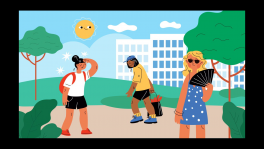Therapists are joining TikTok to help people get through the pandemic
Since the early days of the pandemic, doctors and other medical professionals have taken to social media platforms to spread accurate information and updates about Covid-19, as well as their own experiences on the frontlines fighting the virus. But as the health crisis drags on, licensed therapists and psychiatrists on TikTok are spotlighting the coronavirus crisis' impact on mental health, which some of them say hasn't been discussed nearly enough

Mental health professionals are appearing on popular video making site TikTok to boost up the morale of people for surviving the pandemic.
A clinical psychologist Dr. Julie Smith has uploaded a 15-seconds video on TikTok while dancing while text encourages people not to compare their isolation to others. In another 60-second video, Smith breaks down five ways to tackle anxiety, including slow breathing techniques, reports CNN.
Smith, who also uses Instagram and YouTube, joined TikTok last fall because she didn't see mental health professionals on the short-form video app, which is popular with teens and known for lighthearted content, comedy and dance routines. She hoped to call attention to simple skills people can use to improve their mental health. That goal has arguably only taken on greater urgency in recent months due to the pandemic.
"Being in isolation away from friends and family has brought new challenges to people," Smith, who now has nearly 750,000 followers on TikTok said, "I've been creating videos about how to manage the worry and anxiety that can come with everything going on in the world."
Since the early days of the pandemic, doctors and other medical professionals have taken to social media platforms to spread accurate information and updates about Covid-19, as well as their own experiences on the frontlines fighting the virus. But as the health crisis drags on, licensed therapists and psychiatrists on TikTok are spotlighting the coronavirus crisis' impact on mental health, which some of them say hasn't been discussed nearly enough.
The goal, according to Smith and others, is to raise awareness and remove some of the stigma of discussing mental health issues and seeking treatment. In the process, these professionals are also raising their own profiles in a way that could attract future business.
Almost half of adults in the US reported that stress from the pandemic negatively impacted their mental health, according to a Kaiser Family Foundation poll. The World Health Organization warned this week of a possible "mental health crisis," including for teenagers, pointing to reports from parents in Europe that "their children have had difficulties concentrating, as well as irritability, restlessness and nervousness." And some social media platforms like Facebook are bracing for a spike in user activity referencing suicide and self-harm.
"Being socially isolated increases the risk of pretty much of all mental health issues," said Dr. David Puder, a psychiatrist who joined TikTok in January and now has more than 100,000 followers.
Between seeing patients over video conferencing, teaching psychiatry residents remotely, running an outpatient program for a university and recording episodes of his podcast, Puder's schedule is packed. But during five-minute gaps in his day - at home, in his office or inside his car, he creates videos for TikTok, which range from discussing mental health to dispelling myths about Covid-19, including debunking claims made in a recent viral conspiracy video called "Plandemic."
"My goal is to educate and inspire people to take steps toward improving their mental health," Puder said. "It's important to meet the public where they're at and help dispel some of the myths or decrease some of the fears or conspiracies out there as well."
There appears to be a strong appetite on the platform for mental health content, based on the sizable followings of these therapists and data on TikTok hashtag trends. Hashtags including #mentalhealthawareness, #mentalhealth and #mentalhealthmatters have each been viewed hundreds of millions of times on TikTok.
"There's a value in providing that kind of information and education," said Lynn Bufka, a licensed clinical psychologist and senior director for practice and research policy at the American Psychological Association. But there's an important caveat, "When you're a licensed professional, you need to be really clear you're not providing specific health-care advice or advising anyone on their specific problems and concerns."
Mental health professionals on TikTok agree.
While the primary goal may be calling attention to important mental health issues, some therapists also see a business opportunity, said Marquis Norton, a licensed professional counselor with a Ph.D. in counseling, who has about 75,000 followers on the platform.
He said, "I'm considering ways to monetize his social media presence, for example, by working with brands in the mental health space, or potentially attracting clients for telehealth therapy."


 Keep updated, follow The Business Standard's Google news channel
Keep updated, follow The Business Standard's Google news channel
















